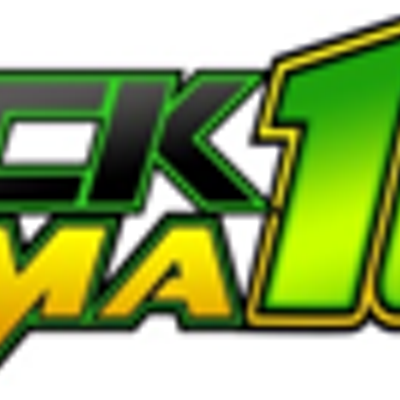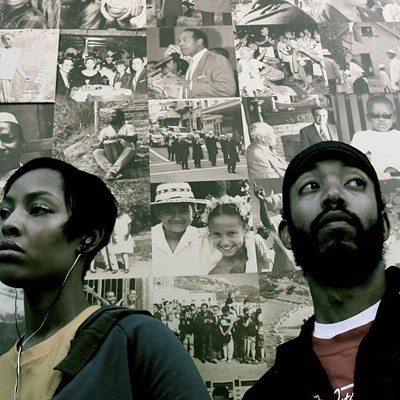On the surface of A.A. Bondy's solo debut, American Hearts (Fat Possum), there isn't much to write home about, just some Skip James-influenced guitar-picking, Bondy's moody tenor and the occasional handclap/foot stomp mixed in with Dylan-esque blasts of harmonica. Not a dazzling sonic approach, sure, but once you sit back, let the music envelop you and listen to Bondy's poetic lyrics, you realize there's more going on here than meets the pop-saturated ears.
And that's when the heartbreak settles in.
A bluesy song like "Vice Rag"--in which Bondy recites a delirious and divine litany of cocaine, whiskey, heroin and Jesus Christ--suggests an apocalyptic imagination at work, while a haunting tune like "Black Rain, Black Rain," with its emphasis on love's infinite capacity and the way it can linger "like a ghost upon a breeze / in a land of elegies," reveals a more sentimental (if intently biblical) character. And in the case of "There's a Reason," you sense a deranged and cosmic presence, as if Bondy is tapping into what rock critic Greil Marcus once labeled "the old, weird America."
Indeed, the overall effect is subtle yet powerful, akin to experiencing a Southern gospel performance in miniature and rendered in terms of a man alone, clutching an acoustic guitar in a cold barn in upstate New York. A propane heater simmers in the corner, providing warmth. Birds chirp. A lone dog barks somewhere off in the distance. The man coughs into the microphone once and presses the "record" button. You don't actually hear these things, of course, but it's all there somehow, in between notes of music.
Although he's arriving late to the indie-folk party--Iron & Wine, Cat Power and Will Oldham have already clobbered that piñata--Bondy's influences are more varied and less insular. American Hearts owes as much to Bob Dylan as it does to novelist Cormac McCarthy, filmmaker Guy Maddin and any number of contemporary painters. I say that, because it's these and many other nonmusical artists Bondy would prefer to discuss, and because the minimalism he displays in his songwriting has little to do with today's "nu-folk" (or whatever you want to call it). Even Bondy's analogies extend into other media, especially on the issue of why he engineered his own album.
"Everyone says (recording with software) sounds better than tape, but one's a facsimile, and the other's the actual document," insists Bondy, 35, during a recent phone interview. "I mean, does a painting look better if it's on a computer? I don't know."
According to Bondy, computer software (like Pro Tools) doesn't sound right to his ears, "like it's not glued together properly."
He continues: "It all depends on what's more important to you--speed and ease, or physicality. If you're relying on a computer-based platform, and something breaks, then you just order a new one. If you're using an old tape head, then you have to wait weeks, maybe months, before it's repaired. I have both a computer and a tape deck, but I never touch the computer. There's just a lack of physicality with software. I don't care about computers, I guess. They're pretty dumb."
Still, it's not like Bondy avoids emerging technology. After all, here's a guy who blogged his tour diary for Billboard magazine. It's just that he feels more comfortable relying on traditional methods to create music, and he's not ready to surrender those methods for convenience. One can find solace in actual knowledge and skills, he believes.
"If you read a book like (Jared Diamond's) Collapse, you learn how certain civilizations gave up certain technologies in exchange for others," Bondy adds. "For instance, people still have no idea exactly how the Egyptian pyramids were constructed. No computer has figured that out yet. Used to be, like in the '60s, you could bring in a car to the mechanic, and he'd tell you what was wrong with it. Today, the mechanic doesn't know anything until he gets a computer to read your car's 'electronic brain.'"
Bondy's brain, like most anyone's, is far from a digital repository. He still writes down lyrics inside a notebook the old-school way. ("I'm no Notorious B.I.G.," he quips.) It's how Bondy, who's originally from Birmingham, Ala., has always done it, even back when he fronted his old rock band Verbena (who recorded two albums for Capitol Records). Although music writers enjoy applying the term "reinvention" to explain away the gulf between his current folk approach and his earlier, noisier efforts, Bondy admits that he has always gravitated toward extreme subject matter.
"Anybody who knows (my work) sees that there's a line running through it all, even if it's not very developed," he says. "Doom is always more interesting. People slow down and look at the car accident and say, 'What the heck happened there?' Art that doesn't deal with extremes isn't worth making or enjoying, someone once said. But I don't set out trying to do anything. You have all these pieces, and if you're lucky, you may assemble something good out of them. Of course, you can't really finish any work of art."
Oddly enough, back when Bondy was in full-on rock mode, his guitar-playing was nowhere near as pyrotechnical as it is today. He chalks it up to the need to create a bigger sound when you're by yourself onstage.
"In order to accompany yourself, you have to come up with more rhythmic stuff," he says. "If you listen to any pre-war blues compilation or anything in the '20s, they're all great guitar players. There aren't many people who can play like that now. Even if you listen to those old Motown recordings, they're almost scientific in the way they're put together, and the musicality is stunning. Anyone can play those chords.
"But the way those musicians go to and from the notes--it's a lost art now. There are people capable of doing it, sure, but for whatever reason, they don't."










